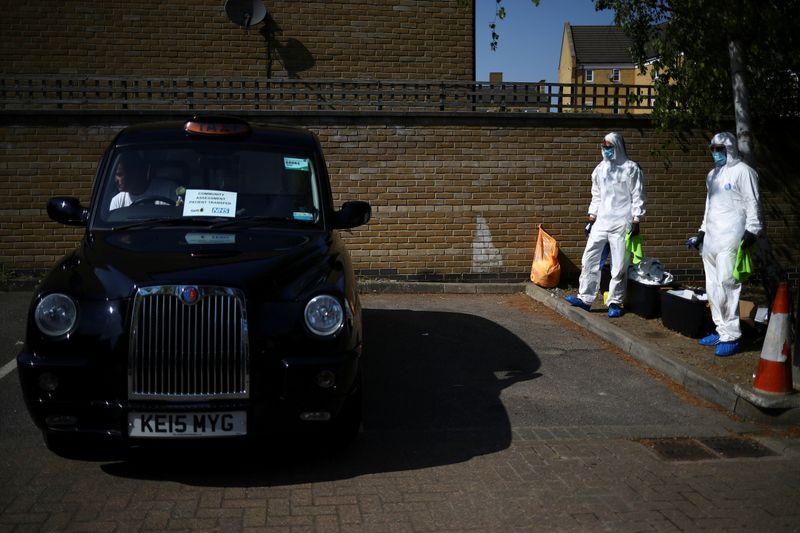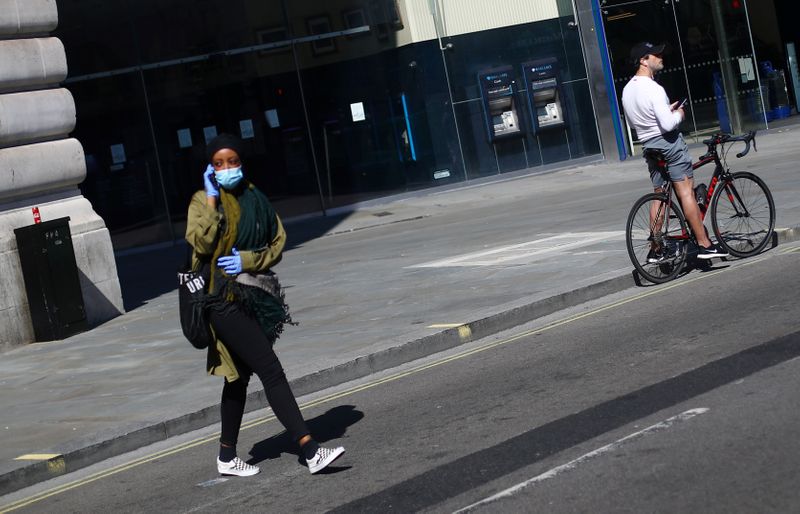By Guy Faulconbridge and Andy Bruce
LONDON (Reuters) - The United Kingdom's economy is crumbling under the strain of the coronavirus lockdown and government borrowing is soaring to the highest levels in peacetime history, increasing pressure on the government to set out an exit strategy.
Prime Minister Boris Johnson, recuperating at his country residence after being seriously ill with COVID-19, is facing criticism from opposition politicians and some epidemiologists for reacting too slowly to the novel coronavirus outbreak.
Ministers are already struggling to explain high death rates, limited testing and shortages of protective kit, and the grim reality of the damage to the world's fifth largest economy hit home on Thursday.
"We are experiencing an economic contraction that is faster and deeper than anything we have seen in the past century, or possibly several centuries," Bank of England interest-rate setter Jan Vlieghe said.
The recovery, he said, was unlikely to be swift.
The IHS Markit/CIPS Flash UK Composite Purchasing Managers' Index (PMI) fell to a new record low of 12.9 from 36.0 in March - not even close to the weakest forecast in a Reuters poll of economists that had pointed to a reading of 31.4.
The UK will issue 180 billion pounds ($222 billion) of government debt between May and July, more than it had previously planned for the entire financial year.
The country's debt mountain exceeds $2.5 trillion and its public sector net borrowing could reach 14% of gross domestic product this year, the biggest single year deficit since World War Two.
A Reuters poll of economists on Thursday pointed to a roughly 13% contraction in economic output in the current quarter, which would be the largest since records began after World War Two.
WAITING FOR A VACCINE
The government's as yet unpublished strategy for unwinding from the lockdown is also under scrutiny. Deutsche Bank (DE:DBKGn) said the country's limited testing capacity is a problem.
"The UK is lagging behind almost any medium to large economy globally when it comes to coronavirus tests," Deutsche Bank's Oliver Harvey said in a note to clients.
Health Secretary Matt Hancock has promised to get 100,000 people per day tested by the end of April, though just 22,814 tests were carried out on April 21 - the latest day for which data is publicly available.
A total of 411,192 people have so far been tested and 559,935 tests have been carried out in total in the United Kingdom.
Restrictions on everyday life are likely to be needed for the "next calendar year" due to the time needed to develop and roll out vaccines or find a cure, the government's chief medical adviser, Chris Whitty, said on Wednesday.
Scientists in Britain began clinical trials of a potential COVID-19 vaccine on Thursday as other vaccine developers across Europe also stepped up work on their own experimental shots against the disease caused by the new coronavirus.
A team at Britain's Oxford University dosed the first volunteers in a trial of their vaccine - called "ChAdOx1 nCoV-19" - while Italy's ReiThera, Germany's Leukocare and Belgium's Univercells said they were working together on another potential shot and aimed to start trials in a few months.

As many as 100 potential COVID-19 candidate vaccines are now under development by biotech and research teams around the world, and at least five of these are in preliminary testing in people in what are known as Phase 1 clinical trials.
